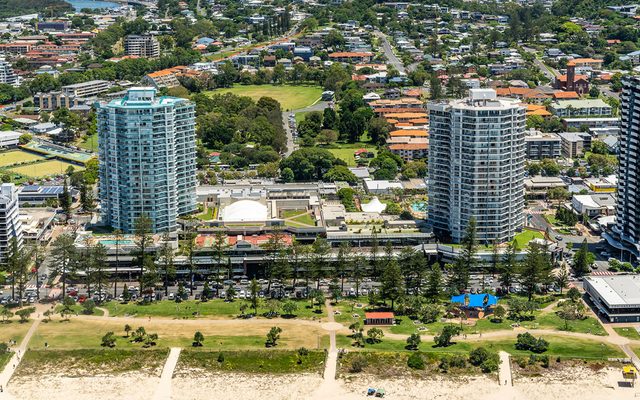This article is from the Australian Property Journal archive
HUNDREDS of millions of dollars’ worth of shopping centres have been tipped to the market this week as activity in the retail sector gathers momentum after being shaken up during COVID.
A 100% interest in the 106,000 sqm, convenience-focused, triple-supermarket-anchored Waverley Gardens Shopping Centre is among the offerings. Acquired by Elanor Investors and an affiliate of Heitman in 2018, the active fund manager has undertaken a $22 million repositioning of the former Target store, relocated of Aldi, and introduced Henry Mercato, TK Maxx, and a dedicated fresh food and health services precinct.
With a book value of $218.50 million, Waverley Gardens – strategically located at the intersection of the Monash Freeway and Eastlink – is 71% gross income weighted towards non-discretionary, services and food tenants and has a 5.3-year weighted average lease expiry by area.
JLL’s Nick Willis, Sam Hatcher and Stuart Taylor and Stonebridge’s Carl Molony, Philip Gartland and Justin Dowers have been appointed to the expressions of interest campaign.
Willis said this is an “unmissable opportunity for both traditional retail investors and mixed-use capital”.
“The centre is among an elite collective of sub-regional centres, being one of only ten assets in metropolitan Melbourne with a land size exceeding 10 hectares, of which, Waverley Gardens is the only asset readily available for an incoming purchaser to acquire a 100% controlling interest.”
“The land holding will drive the investment underwrite, with the scarcity of land across the Melbourne metropolitan area being a major contributor to total investment returns.”
Molony said sub-regional centres have witnessed an influx of capital due to their strong investment thematic, offering a secure cash flow, and in the case of Waverley Gardens, underpinned by a flexible Commercial 1-zoned land holding and replacement cost in excess of investment value.
“The ability for these town centre locations to evolve over time to become vibrant mixed-use precincts, or to satisfy last mile infill demand, is appealing to core and core-plus capital given the combined total returns from the retail and development components satisfy their investor return hurdles”.
Elanor’s co-head of real estate, Michael Baliva, said, “Our completed repositioning ensures that the centre offers a defensive and secure cash flow, supported by its triple supermarket anchored and non-discretionary focused tenancy mix, while also unlocking the property’s alternative use potential to take advantage of its proximity to significant transport infrastructure”.
Expressions of interest close Wednesday, 23rd August.
Meanwhile, the AMP Capital Shopping Centre Fund – taken over by Dexus last year with its acquisition of Collimate Capital’s real estate and infrastructure assets – has put up for sale a 50% stake in Adelaide’s Westfield Tea Tree Plaza with expectations of about $350 million.
Comprising a gross lettable area of 99,873 sqm, the north eastern suburbs centre is anchored by Myer, Big W, Kmart and Target alongside a triple supermarket offering in Coles, Woolworths and Aldi and around 240 specialty stores. It is currently undergoing $40 million in upgrade works that are set to be completed by September.
The centre also includes a dining and entertainment precinct, offering 10 restaurants and a Hoyts cinema complex, forming part of the most recent redevelopment of the centre in 2018.
It is set on a land-rich 20.7-hectare site that provides for significant future expansion potential.
Tea Tree Plaza records annual retail sales of $532 million and has a specialty productivity rate of $12,396 per sqm – 28% above the Urbis 2022 Regional Shopping Centres benchmark of $9,680 per sqm. Major tenants report a combined $246 million in sales per annum and have a long weighted average lease expiry of 9.5 years by gross lettable area and 9.8 years by income.
CBRE’s Simon Rooney, who has the listing, said, “A fortress mall of this quality is always tightly held and we expect significant interest from both domestic and offshore groups, underpinned by the centre’s robust investment fundamentals, Adelaide’s attractive retail yield spread relative to Sydney and Melbourne, and South Australia’s stamp duty exemption on commercial transactions”.
Offshore investors and private players driven by attractive asset pricing have been tipped to dominate Australian retail real estate acquisitions throughout 2023. According to MSCI,private investors accounted for 57% of total transaction values in the first five months of 2023, a jump from the 40% over the same period in 2022. Listed players, on the other hand, made up only 11%, or about $1 billion – an 80% decrease year-on-year.
“One explanation may be the inherent opportunism of private investors. During periods of market turbulence, they often seek out opportunities when more cautious institutional investors remain on the sidelines,” said MSCI head of real assets research, Benjamin Martin-Henry.
While retail activity is starting to pick up, Martin-Henry, speaking on Australian Property Journal’s latest edition of the Talking Property podcast, said pricing is a “huge problem” in the broader commercial real estate market, and there is quite a large gap between buyer and seller expectations. A price adjustment of slightly higher than 15% to 18% is required in the retail sector in order to get back to long-term liquidity levels.






